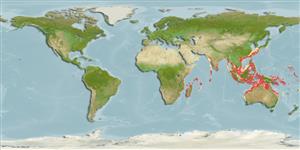Environment: milieu / climate zone / depth range / distribution range
Ecologia
marino demersale; distribuzione batimetrica 45 - 177 m (Ref. 27821). Deep-water
Indo-West Pacific: southern India and Sri Lanka to the Philippines, south to northern Australia and Papua New Guinea (Ref. 6192).
Size / Peso / Age
Maturity: Lm ? range ? - ? cm
Max length : 30.0 cm TL maschio/sesso non determinato; (Ref. 48635)
Differ in color from the more common D. orientalis by the lack of blue lines in the pectoral fins and has a centrally placed dark blotch on the fin instead. Also the body lacks black spots (Ref. 48635).
Found in the continental shelf (Ref. 7300, 75154). Rarely observed due to mud-preferred habitats (Ref. 48635). Benthic (Ref. 75154). Not fished commercially but taken incidentally throughout its range. Usually caught near shore. Marketed fresh occasionally (Ref. 3392).
Life cycle and mating behavior
Maturità | Riproduzione | Deposizione | Uova | Fecundity | Larve
Eschmeyer, W.N., 1997. A new species of dactylopteridae (Pisces) from the Philippines and Australia, with a brief synopsis of the family. Bull. Mar. sci. 60(3):727-738. (Ref. 27821)
IUCN Red List Status (Ref. 130435)
Threat to humans
Harmless
Human uses
Pesca: scarso interesse commerciale; Acquario: Commerciale
Informazioni ulteriori
Nomi ComuniSinonimiMetabolismoPredatoriEcotossicologiaRiproduzioneMaturitàDeposizioneSpawning aggregationFecundityUovaEgg development
BibliografiaAcquacolturaProfilo di acquacolturaVarietàGeneticaElectrophoresesEreditarietàMalattieElaborazioneNutrientsMass conversion
CollaboratoriImmaginiStamps, Coins Misc.SuoniCiguateraVelocitàModalità di nuotoArea branchialeOtolithsCervelliVista
Strumenti
Special reports
Download XML
Fonti Internet
Estimates based on models
Preferred temperature (Ref.
123201): 20.4 - 27.9, mean 25.2 °C (based on 461 cells).
Phylogenetic diversity index (Ref.
82804): PD
50 = 0.5234 [Uniqueness, from 0.5 = low to 2.0 = high].
Bayesian length-weight: a=0.00389 (0.00180 - 0.00842), b=3.12 (2.94 - 3.30), in cm total length, based on all LWR estimates for this body shape (Ref.
93245).
Trophic level (Ref.
69278): 3.5 ±0.5 se; based on size and trophs of closest relatives
Resilienza (Ref.
120179): Alto, tempo minimo di raddoppiamento della popolazione meno di 15 mesi (Preliminary K or Fecundity.).
Fishing Vulnerability (Ref.
59153): Low vulnerability (20 of 100).
